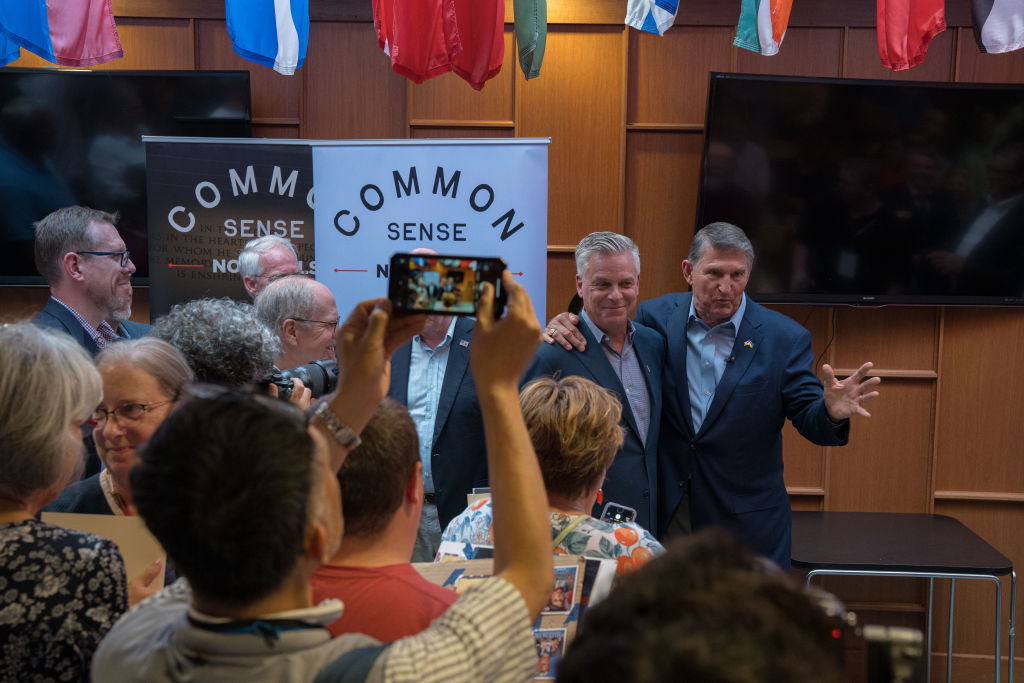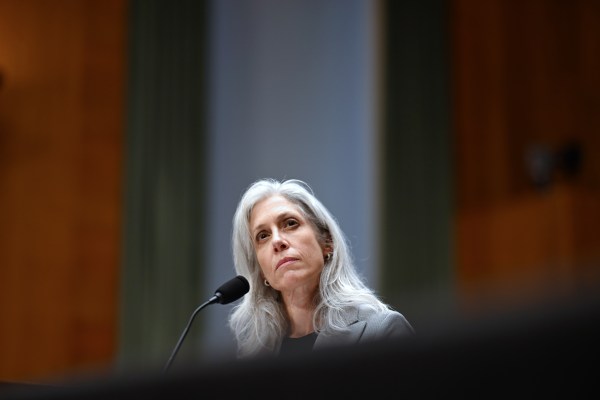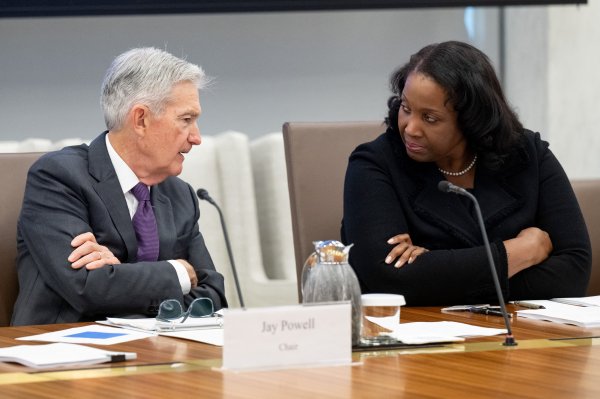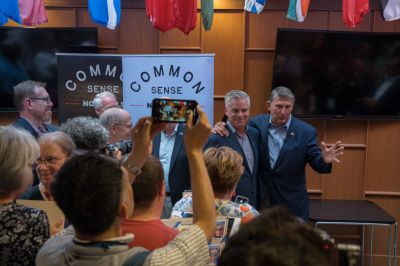Happy Friday! Covering politics means we have to be prepared for the crazy, the unpredictable, or the improbable. Or, in the case of California’s 16th Congressional District, all three. In the March jungle primary, whose final results only just came in this week, two candidates tied for second place with the exact same number of votes.
Up to Speed
- Donald Trump is leading President Joe Biden in six out of seven key swing states, according to a Wall Street Journal poll released Tuesday. The former president holds single-digit leads among registered voters in North Carolina, Arizona, Nevada, Michigan, Pennsylvania, and Georgia. The two presumptive nominees of their parties are tied in Wisconsin. The poll comes about two weeks after a pair of CNN polls found Trump and Biden in dead heats in Michigan and Pennsylvania.
- Despite Biden’s poor performance among swing state voters in the Journal’s poll, he has made up some ground nationally. A new Marist poll finds Biden at 50 percent to Trump’s 48 percent among registered voters nationwide, the first time Biden has been at 50 percent in Marist’s poll this cycle. Meanwhile, Trump’s lead in the RealClearPolitics polling average has fallen to just over 1 point, the lowest since January.
- Some viewers of the NCAA Final Four for both men’s and women’s basketball will see ads from the Biden campaign, according to Medium Buying, which tracks political ad purchases. The ads will air on ESPN and TBS in markets in three key swing states: Wisconsin, Michigan, and Pennsylvania.
- Trump has faced a setback of sorts in Nebraska, where legislators on Wednesday evening blocked a measure that would have allocated all five of the state’s presidential electoral votes to the winner of the statewide vote. Currently, Nebraska awards three of its five electoral votes to the winner in each of its three congressional districts and the remaining two to the winner of the statewide vote. Trump and Republican Gov. Jim Pillen endorsed the change Tuesday, but the effort failed on a procedural vote in Nebraska’s nonpartisan unicameral legislature. It is uncertain whether the measure’s supporters will be able to push the change through before the general election and potentially deprive Biden of a key electoral vote in a tight election.
- On Thursday, Trump also suffered court defeats in two of his criminal indictments. The first came in his election interference case in Georgia, where Judge Scott McAfee rejected a motion to dismiss from Trump’s lawyers, who argued the statements the former president made about the 2020 elections were protected under the First Amendment. In addition, Judge Aileen Cannon, who presides over Trump’s classified documents case in Florida, denied a motion to dismiss the case. His legal team had argued that the documents Trump allegedly mishandled were considered personal under the Presidential Records Act.
- Rep. David Trone refused to commit to debating Prince George’s County Executive Angela Alsobrooks, his opponent in the Democratic primary for the Maryland Senate seat, resulting in the cancellation of the debate. “David has already participated in or committed to more than a dozen public forums and a televised debate,” his campaign said. “We look forward to continuing to campaign in every county in Maryland to talk about the issues that matter with the people who matter most: Marylanders.” Trone led Alsobrooks in a poll in late March, but that survey also saw both of them losing to the presumptive Republican nominee, former Gov. Larry Hogan.
- Democratic Sen. Jacky Rosen of Nevada is making a $14 million TV and radio ad buy, the largest in the state’s history, which will run from the end of July until November, Axios reported Thursday. The report comes a day after the Cook Political Report changed its projection of the state of her race, which could help determine control of the Senate, to a toss-up. In 2022, Republican Adam Laxalt lost to incumbent Democratic Sen. Catherine Cortez Masto by less than 1 point, or about 8,000 votes.
No Labels Ends Troubled White House Bid

After months of failing to lure candidates, centrist political group No Labels on Thursday announced the end of its effort to field a unity White House ticket, which was to include a Republican nominee and Democratic running mate.
Some prominent Republicans recruited to lead the No Labels presidential ticket found leaders of the nonpartisan political organization unprepared for basic questions and lacking command of relevant details during pitch meetings for prospective 2024 contenders, possibly helping explain why the effort was abandoned.
The culprit was multifold, advisers to Republicans approached by No Labels have told The Dispatch. The most-often mentioned complaints about presentations led by the group’s senior officials:
- Polling data meant to prove the viability of a No Labels ticket was superficial and incomplete, at least as revealed.
- Plans for campaign infrastructure and staffing were thin.
- The group had accumulated a massive voter file but left potential recruits with the impression it lacked a file of grassroots donors who give in small amounts online that could be shared with a ticket once nominated.
- There was no roster of designated election lawyers committed to handling the complicated state-by-state litigation made available for the likely event the major political parties challenged the legality of the No Labels ballot line.
- There was little specificity on how much financial support might be expected from New Leaders 2024, the super PAC established to support the group’s White House ticket.
Especially concerning, sources said, was that No Labels officials who ran point in the pitch meetings—sometimes founder and CEO Nancy Jacobson and chief strategist Ryan Clancy—were unable to materially address these concerns, satisfactorily or otherwise, or simply declined to do so.
“It was difficult to get concrete answers, it was all very nebulous,” said a Republican operative who advises a potential No Labels recruit. Added a second GOP operative who advises another politician approached by the group: “We didn’t get a sense of—what’s the underlying data leading them to think we could win?” Our sources requested anonymity in order to speak candidly about private meetings and internal deliberations about whether to accept the No Labels nomination.
No Labels did not respond to a request for comment.
But a source familiar with the group’s operations pushed back on one complaint in particular: the suggestion that No Labels does not possess a file of grassroots donors who contribute in small amounts online. The group does have a “house” donor file, this source said. Meanwhile, No Labels explained in a press release its view of why it was pulling the plug on an effort it had worked toward for more than a year and after spending tens of millions of dollars.
“Americans remain more open to an independent presidential run, and hungrier for unifying national leadership, than ever before. But No Labels has always said we would only offer our ballot line to a ticket if we could identify candidates with a credible path to winning the White House. No such candidates emerged, so the responsible course of action is for us to stand down,” the group said.
The No Labels bid to field a unity presidential ticket grew out of frustration with the possibility that the 2024 election would see a rematch pitting President Joe Biden versus former President Donald Trump. Polling shows a majority of Americans do not want a replay of the 2020 contest, which is now unfolding after Biden and Trump won enough convention delegates in this year’s Democratic and Republican primaries to secure their parties’ nominations for the White House.
But in a hypothetical three-way contest with Biden and Trump, No Labels polling and voter modeling showed the group capturing roughly a third of the vote—ditto the president and his predecessor. Meanwhile, No Labels was handling one key aspect of preparation that can bedevil third-party presidential bids: It was securing ballot lines in the approximately three dozen states where the law permitted.
But along the way, No Labels experienced strategic setbacks, capped by well-known Republicans such as former New Jersey Gov. Chris Christie declining to lead the group’s unity ticket after concluding it would likely grease a path to victory for Trump. (No Labels’ broader, self-declared mandate was that it not make a 2024 run easier for the former president.)
Political observers are not surprised by Thursday’s announcement.
“It seems as if there is no better time than now for a third-party run with widespread dissatisfaction with a Biden-Trump rematch,” said Jeffrey Brauer, a political science professor at Keystone College in northeastern Pennsylvania, who concluded much of No Labels’ problems were “just structural.”
“The U.S. uses a winner-take-all electoral system, which simply means that in almost every case, whoever wins a state wins all the state’s electoral votes,” Brauer explained. “This basically makes it impossible for a third party to even win any electoral votes, let alone an entire presidential election.” He added: “Republican and Democrat leaders know these realities of American politics. Therefore, they are very hesitant to join a third-party movement, especially if they aspire to a future political career.”
Meanwhile, Democrats concerned that a No Labels ticket would benefit Trump are rejoicing. One frequent critic of No Labels was the center-left Democratic group Third Way, which mounted a sustained campaign against the idea of a unity ticket.
“We are deeply relieved that everyone rejected their offer, forcing them to stand down,” said Third Way spokesman Matt Bennett. “While the threat of third-party spoilers remains, this uniquely damaging attack on President Biden and Democrats from the center has at last ended.”
Notable and Quotable
“Me as a person? I would vote for Biden over Trump.”
—No Labels National Director and former Democratic Rep. Joe Cunningham to Fox News’ Neil Cavuto after the group announced it was abandoning its attempt to field a presidential ticket.








Please note that we at The Dispatch hold ourselves, our work, and our commenters to a higher standard than other places on the internet. We welcome comments that foster genuine debate or discussion—including comments critical of us or our work—but responses that include ad hominem attacks on fellow Dispatch members or are intended to stoke fear and anger may be moderated.
With your membership, you only have the ability to comment on The Morning Dispatch articles. Consider upgrading to join the conversation everywhere.